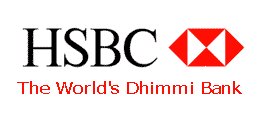HSBC: The World's Dhimmi Bank!
 HSBC launches Shar'ia compliant 'multimanager' fund.
HSBC launches Shar'ia compliant 'multimanager' fund.When you look a little further into the question of Islamic banking, you find that it is not, in fact, required by Islam. Al-Azhar University, in Cairo, the main and ancient home of Sunni religious learning, teaches that "riba" means extortionate interest, not any interest at all, and that moderate interest should be permitted. Most Egyptian banks charge and pay interest. Even Muslims who reject this interpretation say that the doctrine of "extreme necessity" permits Muslims in non-Muslim countries to pay interest.
So what is being proposed with Islamic banking is actually a hardening of the religion, not an accommodation of its existing custom. It is rather as if Catholics, arriving in large numbers in a Muslim country, insisted that they must eat fish rather than meat on a Friday, a rule which has been dropped by the Church in modern times. And when you look at HSBC's Sharia Board you find that a couple of its members have links with the Deoband, the long-standing ultra-conservative group whose schools in Pakistan educated many of the Taliban.
Bit from the telegraph that I have copied below...
Two others are Wahhabis, trained by the intolerant and puritanical school of thought that dominates the religious life of Saudi Arabia. If HSBC had a Christian Banking Board would they staff it with disciples of the Rev Ian Paisley, the Rev Jerry Falwell and the followers of the late Archbishop Lefebvre, rather than nice Dr Rowan Williams or Cardinal Cormac Murphy-O'Connor?
I return to the question of diversity. What happens if an important element of the mixture does not itself believe in diversity, but solely in the advance of its own interest? I was very struck by a remark of Sheikh Yusuf al-Qaradawi, the militant but apparently mainstream theologian and supporter of suicide bombing, whose visit to the Regent's Park mosque last month caused a fuss.
Justifying his view that all Israelis are legitimate targets, he has declared: "Islam says that the majority prevails on all and the rare has no rule." Reading and asking about this, I find that although many, many Muslims would not apply this teaching to the Israelis as he does, they do confirm that this attitude to the idea of a minority is part of the religion.
Islam means "submission" (not "peace") and it is the aim of Muslims ("those who have submitted") to make the whole world submit. The teaching seems not to envisage the idea of Muslims as a minority, except as a temporary phenomenon. The best that non-Muslims - in Britain that means Sikhs and Hindus, as well as Jews and Christians - can hope for is that they be treated as "dhimmis", second-class citizens within the Islamic state.
Well, you might say, Christians want the whole world to be Christian, so what is the difference? The difference seems to lie in the attitude to politics. For many centuries now, Christians have developed the idea that there is a separation between Church and state, between what you may believe and what you may enforce. Islam does not seem to have the same idea.
In a fascinating new research project on Islam in modern Britain conducted by the Institute for the Study of Islam and Christianity, the author, Patrick Sookhdeo, quotes from a best-selling book put out by the influential and longstanding Muslim Educational Trust called Islam: Belief and Teachings.
"Religion and politics," it says, "are one and the same in Islam." Mohammed did not only preach in Mecca; he also ruled in Medina, and he conquered. The Sharia is a code of law to be imposed, in all societies, by the public authorities. It calls, among other things, for apostates - those who have abandoned Islam - to be put to death.
David Blunkett wants a law to prohibit religious insult. He presumably does not see this as a step along the road to item 295c of the Pakistan penal code, which makes defiling the name of Mohammed punishable by death. But many Muslims would.
It does not necessarily follow that most Muslims will try to impose their beliefs on this country by violence. We see all around us the evidence of hundreds of thousands of people living peacefully and productively with their neighbours. But it perhaps does mean that we cannot just regard Islam in Britain as a charmingly exotic addition to the English country garden.
According to its own beliefs, particularly in their currently militant form, it is much more acquisitive.
Islam seeks an ever greater share of the British public space. That is why Muslims were so keen on introducing a religious question into the latest census, why they seek legal acceptance of their marriage laws, and why they want state money for Muslim schools.
Once there are Islamic financial institutions, how long will it be before Muslims insist that the state and business direct all their monetary dealings with Muslims through these institutions (boycotting businesses with Jewish connections en route)? How long before Muslims, extending the logic of their concentration in places like Bradford and Leicester, seek to establish their own law within these areas, the germ of a state within a state? And how diverse would such a state be?
** Had to put this article on the site, mostly for the fact that many moons ago I worked for HSBC at their office in Newport. Have to admit to holding a grudge against the place as it was a crap company to work for, and any small way I can stick the knife into them gives me some satisfaction.









































































































































































































































0 people have spoken:
Post a Comment